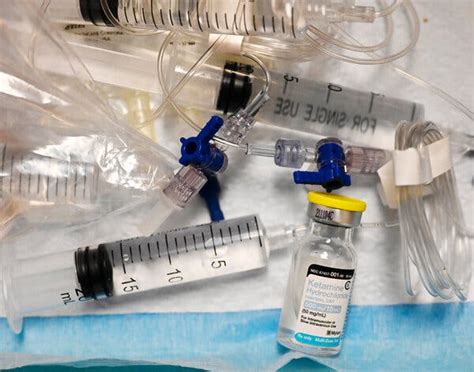Ketamine Injection For Depression

In recent years, the mental health field has seen a growing interest in innovative treatments for depression, a condition that affects millions worldwide. Among these novel approaches, ketamine infusion therapy has emerged as a promising option, offering a potential breakthrough for individuals struggling with treatment-resistant depression.
Ketamine, a medication primarily known for its anesthetic properties, has demonstrated remarkable antidepressant effects when administered in controlled settings. This has led to a surge in research and clinical trials exploring its potential as a rapid-acting treatment for depression, particularly for those who have not responded to conventional antidepressants.
This article delves into the world of ketamine infusion therapy, examining its mechanism of action, clinical effectiveness, and potential risks. By presenting a comprehensive overview, we aim to provide an insightful guide for individuals considering this treatment option and for mental health professionals seeking to understand its place in contemporary depression management.
Understanding Ketamine Infusion Therapy for Depression

Ketamine infusion therapy involves the administration of a low dose of ketamine, typically through an intravenous (IV) drip, to induce rapid antidepressant effects. This form of therapy is particularly appealing due to its potential to provide relief within hours or days, in contrast to traditional antidepressants that often take weeks to show significant effects.
The mechanism behind ketamine's antidepressant action is believed to be its ability to modulate glutamate neurotransmission, a key neurotransmitter involved in mood regulation. Ketamine acts on glutamate receptors, specifically the NMDA receptor, leading to an increase in synaptic connections and enhanced neural plasticity. This process is thought to underlie the rapid and robust antidepressant response seen with ketamine treatment.
The Role of Glutamate in Depression and Ketamine’s Mechanism
Depression, a complex mood disorder, is believed to be associated with imbalances in various neurotransmitter systems, including serotonin, norepinephrine, and glutamate. While traditional antidepressants primarily target serotonin and norepinephrine reuptake, ketamine’s unique mechanism involves modulating glutamate activity, offering a different therapeutic approach.
Glutamate is the brain's primary excitatory neurotransmitter and plays a crucial role in synaptic plasticity, learning, and memory. In depression, there is evidence of altered glutamate metabolism and reduced glutamate receptor function. Ketamine, by blocking NMDA receptors and thereby reducing glutamate activity, can lead to a rapid increase in synaptic connections and an antidepressant effect.
| Neurotransmitter | Role in Depression |
|---|---|
| Serotonin | Often associated with mood regulation, traditional antidepressants typically focus on increasing serotonin levels. |
| Norepinephrine | Another key player in mood and stress response, norepinephrine imbalances are linked to depression. |
| Glutamate | The primary focus of ketamine therapy, glutamate's role in synaptic plasticity and mood regulation makes it a promising target for rapid antidepressant action. |

The specific molecular pathways and long-term effects of ketamine on depression are still under investigation, but its unique mechanism of action offers a fresh perspective in the field of antidepressant treatment.
Clinical Effectiveness of Ketamine Infusion Therapy

Numerous clinical trials and research studies have explored the efficacy of ketamine infusion therapy for depression. The results have been encouraging, with many patients experiencing significant improvements in their depressive symptoms within a short period after treatment.
Rapid Response and Long-Term Benefits
One of the most notable advantages of ketamine infusion therapy is its rapid onset of action. Unlike traditional antidepressants that can take several weeks to show effects, ketamine has been shown to reduce depressive symptoms within hours or days. This rapid response can be life-changing for individuals experiencing severe and debilitating depression.
Furthermore, the benefits of ketamine infusion therapy seem to extend beyond the initial treatment period. Some studies suggest that the antidepressant effects can last for weeks or even months, particularly when combined with ongoing psychotherapy and other supportive treatments. This suggests that ketamine may not only provide acute relief but also contribute to long-term management of depression.
Evidence from Clinical Trials and Real-World Data
Multiple randomized controlled trials have demonstrated the efficacy of ketamine infusion therapy for depression. For instance, a study published in The American Journal of Psychiatry found that a single dose of ketamine reduced depression symptoms by more than 50% in a significant proportion of participants within 24 hours. The effects were sustained for up to a week.
Real-world data from clinics offering ketamine infusion therapy also support its effectiveness. Many patients report significant improvements in mood, energy levels, and overall quality of life. While individual responses may vary, the overall trend suggests that ketamine can be a valuable tool in the management of depression, especially for those who have not responded to other treatments.
Safety and Side Effects of Ketamine Infusion Therapy
While ketamine infusion therapy shows promise, it is essential to consider the potential risks and side effects associated with this treatment. Ketamine, when administered correctly and under medical supervision, is generally well-tolerated, but it can have short-term side effects and may not be suitable for everyone.
Common Side Effects and Their Management
The most common side effects of ketamine infusion therapy include dizziness, nausea, dissociation (a sense of detachment from one’s body or environment), and increased blood pressure. These effects are typically mild to moderate and resolve quickly after the infusion. Medical professionals closely monitor patients during the infusion to ensure safety and comfort.
To manage these side effects, clinics often employ strategies such as slow infusion rates, providing supportive care during the infusion (e.g., comfortable environment, calming music), and offering medications to mitigate nausea or dizziness. The goal is to maximize the therapeutic benefits while minimizing any discomfort.
Potential Risks and Considerations
Despite its promising antidepressant effects, ketamine is a powerful drug, and its use in depression treatment requires careful consideration. Ketamine has a history of recreational use and abuse, and there are concerns about its potential for dependence and misuse. However, when administered in controlled medical settings, the risk of addiction is significantly reduced.
Additionally, ketamine may not be suitable for individuals with certain medical conditions, such as uncontrolled hypertension, cardiovascular disease, or a history of psychotic disorders. A thorough medical evaluation is necessary before initiating ketamine infusion therapy to ensure patient safety and suitability.
The Future of Ketamine Infusion Therapy in Depression Treatment
The exploration of ketamine infusion therapy for depression is an exciting development in the field of mental health. While it is not a cure-all solution, its rapid and robust antidepressant effects offer a much-needed alternative for individuals with treatment-resistant depression.
Ongoing Research and Therapeutic Advances
Research into ketamine’s antidepressant properties is ongoing, with studies investigating various aspects, including optimal dosing, long-term effectiveness, and the development of new formulations that can be administered more conveniently. Scientists are also exploring the potential of combining ketamine with other treatments, such as psychotherapy or transcranial magnetic stimulation, to enhance its effectiveness and durability.
Furthermore, the field is moving towards a more personalized approach to ketamine therapy, recognizing that the response to treatment may vary among individuals. This involves tailoring treatment plans based on factors such as the severity of depression, previous treatment history, and individual patient needs.
Expanding Access and Standardizing Care
As the evidence for ketamine’s efficacy in depression treatment grows, there is a push to expand access to this therapy. This includes developing guidelines for its use, training mental health professionals in its administration, and ensuring that patients can access this treatment safely and affordably.
Standardizing care is crucial to ensure consistent and high-quality treatment across different clinics. This involves establishing protocols for patient selection, dosing, and monitoring, as well as guidelines for managing side effects and potential adverse events.
How often can ketamine infusion therapy be administered for depression?
+The frequency of ketamine infusions depends on the individual’s response to treatment. Typically, a series of infusions are administered over a short period (e.g., 6-8 sessions within a few weeks). After this initial phase, maintenance infusions may be recommended every few weeks or months to sustain the antidepressant effects.
Is ketamine infusion therapy covered by insurance?
+Insurance coverage for ketamine infusion therapy varies widely. While some insurance providers may cover it as a treatment for depression, others may not. It is essential to check with your insurance company and the clinic providing the treatment to understand the coverage and potential out-of-pocket costs.
What are the long-term effects of ketamine infusion therapy for depression?
+The long-term effects of ketamine infusion therapy are still being studied. While some research suggests sustained antidepressant effects for several weeks or months after treatment, the durability of these effects over an extended period is not yet fully understood. Ongoing research aims to clarify these long-term outcomes.
Can ketamine infusion therapy be used as a standalone treatment for depression, or is it typically combined with other therapies?
+Ketamine infusion therapy is often used as a part of a comprehensive treatment plan for depression, which may include psychotherapy, lifestyle modifications, and other medications. While it can provide rapid relief, the long-term management of depression typically involves a combination of approaches tailored to the individual’s needs.



